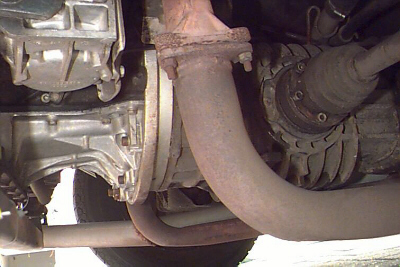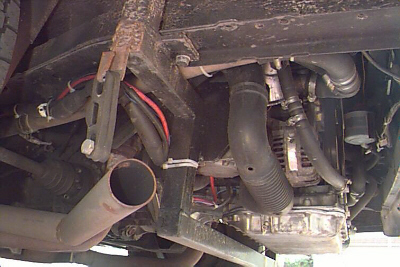
V6-Vanagon? Well, of course!

The whole conversion is based on using
an adapter between engine and transmission. This is much less expensive than replacing the
bell-housing.
First, all the wires were removed from
the boxer engine. The power steering and cooling pipes were
removed next. After the whole exhaust system was removed,
the rear engine carrier was unbolted from the chassis. The engine can be
lowered down and out of the car, pivoting on the front transmission mount.
With the engine on the ground, the front transmission mount is unbolted,
and the engine/transmission is removed as an assembly. With the engine separated
from the transmission, the adapter plate and V-6 engine is installed.
The installation of the Audi is the reverse of the above procedure.
First, the front transmission mount is attached, then the engine can be swung up.
Itīs quite narrow, so coolant resevoir was removed during installation. The opening
of the engine compartment has to be cut out a bit behind the rear
seats, ca. 2-4cm, so that the muffler of the Audi air intake
system does not touch the chassis. The new rear engine carrier is
home-made. The engine mounts from the Audi are retained,
and the carrier is bolted to the chassis with 4 screws. The
principle of mounting stays the same as the boxer-mounting. As
additional protection we used the last bolt of the trailer
coupling to stabilize the whole assembly.
The wiring is not very complicated, though it takes a lot of time
to get the wires for the engine separated from the rest of the harness
(without cutting any engine wires!) and the plugs correctly connected to
the engine. The hardware controller of the engine is placed under
the rear seat, like it was before. The starter is connected the
same way as the boxer was (becomes clear with the help of a
circuit diagram of both VW and Audi). Since the starter of the
Audi is attached on the left, the old starter however on the
right, we extended the wires of the Vanagon to the left (way over
the transmisson).
Afterwards the VW-wires in the
front left box in the engine compartment have to be adapted to
those of the Audi (though not the connection of the tail
lights!!!): Generator light, 2x oil pressure, temperature, rpm,
low coolant warning (all other plugs of the V6 that were not
needed are under the rear seat). A circuit diagram of both cars
is almost essential. One connection is made from the generator to
the audi controller (pin 30), the starter is directly connected
to the ignition key (pin 50, I guess). The gasoline pump is
connected with its two pins to the Audi controller (with a
relay).
Then the power steering of the Audi
is connected with the pipes of the vanagon. The servo-pump and
the pipes of the Vanagon can easily be connected. You only have
to bend the pipes to fit through the V of the engine.
The cooling system is taken over
1:1, both hoses of the large cooling circuit of the Audi (at the
rear end) are put together with those of the Vanagon (the large
hoses of the VW-system). It is quite suitable to use the cooling
pipes of old Vanagons as extension. The hoses of the heating
circuit (at the front end of the Audi) are also connected with
those of the VW (the small hoses).
The exhaust system:
We used an system with two
catalysts, which are flanged directly to the Audi like they
always are in "real" Audis, after that is a y-adapter
followed by a large pipe that travels forward almost to the fuel tank. Then we used
a 180° piece and a long pipe to go back to the rear end of the
Vanagon with a first muffler welded between. On the left side we
connected the whole system to a self-built final mufler which has
the same attributes as the original Audi muffler. This way, we could
hide the whole exhaust system in the middle compartment under the
VW.
There are engines with only one catalyst. One must consider whether or not
the exhaust system can be built the same way.
Thatīs all. A final hint: The box
of the air filter of the Audi is too large to get it into the
engine compartment of the VW, so we used one of the VW Passat VR6
instead. But I will replace it with a different one sooner or later because itīs
quite difficult to change the filter itself.

A quick summary of the conversion:
1. Get an adapter (or what!?)
2. Loosen wires and hoses
3. Loosen exhaust system (perhaps
after the engine removal, because it is very tight!)
4. Loosen rear engine carrier, swing entire assembly down
5. Loosen transmission, get the
old engine out ( quickly ;-))
6. Connect transmission with
engine using the adapter
7. Connect transmission with
chassis
8. Bolt carrier to the V6 and to
the chassis
9. Complete wiring of the V6
10. Complete wiring of the starter
11. Adapt Audi wires to VW wires
12. Connect the power steering
13. Mount the Audi cooling pipes
to the VW
14. Pray for getting a good
exhaust system!
Last updated:
02.21.1998
![]()

